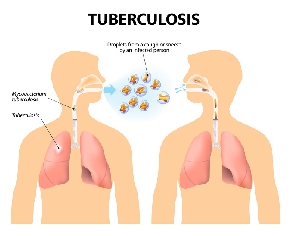The National Tuberculosis Control Programme, in collaboration with the Noguchi Memorial Institute for Medical Research (NMIMR), has embarked on an outreach programme to educate the public and create awareness on Tuberculosis and the need to seek early treatment.
The event, which was held at the Korle-Bu Teaching Hospital on Wednesday, was to mark World Tuberculosis Day and to analyse the contributions of health practitioners to the fight against the disease.
Dr Dorothy Yeboah-Manu, Chairperson of National TB Control Programme Advisory Board and a Professor at NMIMR, said the programme was to remind the public that the fight against TB was not over, adding that diabetic patients were highly prone to the disease.
She said Tuberculosis was the number one killer infectious disease before COVID-19 and that there was the need for intensive public awareness creation on the threat it posed to the lives of Ghanaians and people around the world.
She said the disease was curable and there was medication available at the various hospitals across the country, adding, “Individuals with Tuberculosis can go to the nearest hospital for treatment which is free of charge.”
Dr Yeboah-Manu said although most adults in developing countries, including Ghana, had come into contact with the TB germs, their immune system was able to fight the disease and, therefore, did not become sick.
She, however, said there were some harmful habits such as smoking and alcoholism and a condition like HIV/AIDS could make an individual susceptible to TB.
Dr Yeboah-Manu said diabetes made the “human body soldiers very hungry and tired and consequently unable to fight the sicknesses they would normally fight and this could have devastating consequences on the individual.”
She said, previously, health professionals thought a non-communicable disease like diabetes was not a big issue and that now the changes in the lifestyle of people in Ghanaian communities were driving the sickness.
“If we are not careful, we are going to have what we call co-epidemic of diabetes and TB.”
Dr Yeboah-Manu urged people who were diabetic to get screened early as this was necessary to help control the development of TB.
She said the symptoms of Tuberculosis were very similar to that of COVID-19 and encouraged people who may exhibit such signs to visit a hospital for diagnosis and early treatment.
Dr Adwoa Asante-Poku, a senior research fellow at Noguchi, said the Institute in collaboration with the Chest Disease Department of the Korle-Bu Teaching Hospital and the National Tuberculosis Control Programme had researched on Tuberculosis in the past twenty years.
She said the first prevalence survey of Tuberculosis carried out in Ghana showed that the reports which were being sent initially to the World Health Organization (WHO) were underestimated.
Dr Asante-Poku said during their survey, they found out that Ghana was one of the risk countries for Tuberculosis and HIV.
She said they also discovered that drug-resistance to TB in Ghana was very low and cautioned the public not to be negligent in the fight against the disease based on this discovery as that could lead to an increase in the rate of infection.
“If we lose our guard, drug-resistant TB which is very difficult to treat would go high,” she said.
Dr Asante-Poku said drugs used for the treatment of TB were taken for six months whereas those used for drug-resistant people take two years.
She said they were using World Tuberculosis Day to educate the masses on TB and to let them know that it was curable.
Health News of Thursday, 25 March 2021
Source: GNA













